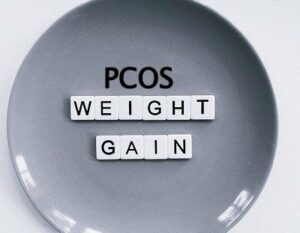If you have been struggling to lose weight, even if you are following a healthy diet and exercising regularly, you may want to consider the possibility that you have PCOS. Polycystic ovary syndrome is a condition that can cause women to gain weight, especially in the abdominal area. If you think you may have PCOS, it is important to see your doctor for diagnosis and treatment. In this blog post, we will discuss the link between PCOS and weight gain, as well as some of the symptoms of PCOS.
Contents
Understanding PCOS And Weight Gain
PCOS is described as a “hormonal disorder” that can cause missed or irregular periods, as well as other symptoms. The mainstay of treatment for PCOS is birth control pills, which can help to regulate hormones and decrease some symptoms.
Moreover, PCOS refers to polycystic ovary syndrome. The ovaries become enlarged and contain small collections of fluid (follicles) on their outer edges. This affects as many as one in ten women of childbearing age. It is also one of the most common causes of infertility.
Weight gain with PCOS is often related to insulin resistance. Insulin is a hormone that helps the body to use sugar (glucose) for energy. When you have PCOS, your body may make too much insulin or your cells may become resistant to it. This can lead to weight gain, as well as other symptoms like excess hair growth and acne.
Many women who have PCOS are overweight or obese. Losing weight can help to improve symptoms and may even reverse some of the effects of PCOS. Even a small amount of weight loss (just five to ten percent of your body weight) can improve insulin resistance, menstrual regularity, and fertility.
So, if you’re struggling with your weight, PCOS may be to blame. But don’t despair – there are things you can do to manage your weight and improve your health. Talk to your doctor about a treatment plan that’s right for you.
Relation Between Polycystic Ovary Syndrome And Weight Gain
There is a strong link between PCOS and weight gain. Women with PCOS are more likely to be overweight or obese than women without the condition. In fact, obesity is one of the most common symptoms of PCOS.
There are a few reasons why PCOS and weight gain are so closely linked.
One reason is that high levels of insulin can lead to weight gain. Insulin is a hormone that helps the body use glucose for energy. Women with PCOS often have high levels of insulin because their bodies are resistant to its effects. This can cause them to store more fat and have trouble losing weight.
Another reason why PCOS and weight gain are linked is that the condition can lead to inflammation. Inflammation is a natural response of the body to injury or infection. But, when it happens chronically, it can lead to weight gain. Women with PCOS often have chronic inflammation due to the high levels of hormones in their bodies.
Lastly, PCOS can cause changes in metabolism. A slow metabolism can make it difficult to lose weight. And, it can lead to weight gain. PCOS can also cause cravings for sugary and fatty foods. These cravings can make it hard to stick to a healthy diet.
If you are struggling with PCOS and weight gain, you need to understand that both shares a symbiotic relationship. Weight gain can worsen the symptoms of PCOS and vice versa. Losing even a small amount of weight can help to reduce insulin resistance and improve other symptoms. You need to be aware of both conditions and get the right help to improve.
If you have PCOS, it is important to talk to your doctor about ways to manage your weight. There are a number of treatment options available that can help you lose weight and improve your health.
Warning Signs Associated With PCOS And Weight Gain
 There are a few warning signs associated with PCOS and weight gain. If you experience any of the following, it’s important to contact your healthcare provider:
There are a few warning signs associated with PCOS and weight gain. If you experience any of the following, it’s important to contact your healthcare provider:
- A sudden or gradual increase in weight
- Thinning hair on your head or excess hair growth on your face, chest, or back
- Irregular periods or no periods at all
- Ovarian cysts
- Trouble getting pregnant
- Acne
- Darkening of the skin on the neck, breasts, or inner thighs
If you’re struggling with your weight, PCOS may be to blame. But before any official diagnosis can be made, you’ll need to see your healthcare provider for a few tests.
These may include:
- A pelvic exam
- Blood tests
- Ultrasound
Once PCOS is confirmed, there are treatments available that can help you lose weight and manage the symptoms of this disorder. But it’s important to remember that everyone’s experience with PCOS is different, so what works for one person may not work for another.
That’s why it’s important to work with your healthcare provider to develop a treatment plan that’s right for you. If you’re struggling to lose weight on your own, don’t hesitate to ask for help. There are plenty of resources available to support you on your journey.
Impacts On Everyday Life
 With PCOS and weight gain, there are many impacts that can be felt on a day-to-day basis. Some of these include:
With PCOS and weight gain, there are many impacts that can be felt on a day-to-day basis. Some of these include:
Feeling tired all the time
This is one of the most common symptoms and can be extremely frustrating. It’s often hard to get out of bed in the morning, and you may find yourself struggling to make it through the day. In fact, low energy is one of the main reasons why PCOS and weight gain can be so difficult to manage.
Brain fog
This is another common symptom associated with PCOS. You may find it hard to focus or concentrate on tasks, and you may feel more forgetful than usual. Brain fog can be caused by hormonal imbalances, insulin resistance, and inflammation. Also, it is more concerned with the severity of your PCOS symptoms.
Sleep problems
It is very common for women with PCOS to have sleep problems. This can be due to a hormonal imbalance, which can cause anxiety and depression. Sleep disorders can also be caused by the insulin resistance associated with PCOS. If you are having trouble sleeping, it is important to talk to your doctor about treatment options. Because lack of sleep can exacerbate PCOS symptoms, it is important to get adequate rest.
Mood swings
Mood swings in women with PCOS are also common. Many women report feeling more irritable, anxious, or even depressed. These mood swings can be a result of the hormonal changes that are occurring in your body. In fact, these swings are so common that they’re often one of the first symptoms women notice.
Acne breakouts
It is very common for women with PCOS to have trouble with acne breakouts. The excess testosterone in their bodies can cause an increase in sebum production, which can lead to clogged pores and blemishes. Many women with PCOS find that birth control pills help to regulate their hormones and clear up their skin.
Health problems
 There are a number of health problems that can be associated with PCOS, including:
There are a number of health problems that can be associated with PCOS, including:
- Insulin resistance
- Type II diabetes
- High cholesterol
- High blood pressure
- Uterine cancer
These are just a few of the potential health problems that can be caused by PCOS. If you are experiencing any of these symptoms, it is important to see your doctor for a proper diagnosis.
So, these are some basic things in which PCOS and weight gain impact your daily life. And disrupts your daily life with even more problems like sleep apnea, anxiety, and depression. However, it is important to remember that everyone experiences PCOS differently. If you are struggling with your weight, please speak to your doctor about the best course of action for you.
How To Treat PCOS And Weight Gain?
When you are supposedly gained weight due to PCOS then the first step is to get yourself diagnosed by a doctor. Self-diagnosis is not at all recommended as it might lead to wrong medication and other treatments.
After the diagnosis, the doctor will be in a better position to suggest you the right kind of treatment. But yes, there are a few things that you can do on your own to bring the PCOS and weight gain under control.
Here are a few tips:
Eat a nutritious and balanced diet
This is the most important thing that you need to do in order to lose weight. Make sure that your diet is rich in proteins, fiber, vitamins, and minerals. Avoid processed and sugary foods as they can make the situation worse. You should not underestimate the importance of a healthy diet. It is essential to eat a nutritious and balanced diet whether you are suffering from PCOS or not.
Exercise regularly
This is another important thing that you need to do in order to lose weight. Exercise can help you to burn calories and also regulate the insulin levels in your body. It is advisable to exercise for at least 30 minutes every day. You can do any kind of exercise like walking, jogging, swimming, etc. In fact, being active and exercising regularly is good for your overall health.
Get enough sleep
Sleep plays a very important role in our overall health. Getting enough sleep can help to regulate the hormones in our bodies. It is advisable to get at least eight hours of sleep every day. In fact, studies have found that people who sleep for less than eight hours are more likely to suffer from obesity. So, enough rest is required and this can be one of the best ways to prevent PCOS and weight gain.
Reduce stress
 Stress can trigger the release of certain hormones in our bodies, which can lead to weight gain and other PCOS symptoms. Learning how to manage stress can help alleviate some of the symptoms of PCOS. Because it is natural to have some stress in our lives, we need to find ways to cope with it in a healthy way. You can try positive affirmations and motivation, journaling, and deep breathing exercises to help you better manage stress.
Stress can trigger the release of certain hormones in our bodies, which can lead to weight gain and other PCOS symptoms. Learning how to manage stress can help alleviate some of the symptoms of PCOS. Because it is natural to have some stress in our lives, we need to find ways to cope with it in a healthy way. You can try positive affirmations and motivation, journaling, and deep breathing exercises to help you better manage stress.
Avoid substance abuse
This is really important for PCOS sufferers in order to avoid weight gain. Alcohol and drugs can lead to weight gain, and they can also worsen the symptoms of PCOS. It is also believed that they can interfere with the body’s natural hormone production. If you are struggling with substance abuse, please seek help from a professional.
With all these tips, you will be on your way to managing PCOS and keeping the weight off! Remember to talk to your doctor before making any major changes to your lifestyle.
And there you have it! These are some tips to help you with PCOS and weight gain. Also, do not forget to consult with a professional because they know more about this matter. Stay strong and do not give up! You can definitely manage this! Remember, you are not alone in this battle.
Conclusion
To conclude, polycystic ovary syndrome and weight gain are often connected. If you are struggling with your weight, it is important to talk to your doctor to see if PCOS may be the cause. There are treatments available that can help you manage your weight and improve your overall health.
Also, PCOS is a serious condition that needs proper medical attention. If you think you may have PCOS, be sure to see your doctor for a diagnosis. With treatment, you can manage your symptoms and live a healthy life.
However, if you are struggling with your weight gain and PCOS, then you can talk to a professional at Mantra Care for help! Talking to them and help from a therapist and dietician can make a world of difference.
We can help you develop a healthy weight loss plan that is tailored to your specific needs and goals. As always, consult with a dietitian or nutritionist if you have any questions or concerns about starting a new diet or management of your weight!


